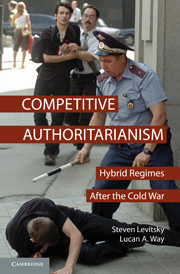Book contents
- Frontmatter
- Contents
- Acknowledgments
- Acronyms and Abbreviations
- Part I Introduction and Theory
- Part II High Linkage and Democratization: Eastern Europe and the Americas
- Part III The Dynamics of Competitive Authoritarianism in Low-Linkage Regions: The Former Soviet Union, Africa, and Asia
- 8 Conclusion
- Appendix I Measuring Competitive Authoritarianism and Authoritarian Stability
- Appendix II Measuring Leverage
- Appendix III Measuring Linkage
- Appendix IV Measuring Organizational Power
- References
- Index
8 - Conclusion
Published online by Cambridge University Press: 05 June 2012
- Frontmatter
- Contents
- Acknowledgments
- Acronyms and Abbreviations
- Part I Introduction and Theory
- Part II High Linkage and Democratization: Eastern Europe and the Americas
- Part III The Dynamics of Competitive Authoritarianism in Low-Linkage Regions: The Former Soviet Union, Africa, and Asia
- 8 Conclusion
- Appendix I Measuring Competitive Authoritarianism and Authoritarian Stability
- Appendix II Measuring Leverage
- Appendix III Measuring Linkage
- Appendix IV Measuring Organizational Power
- References
- Index
Summary
Competitive authoritarianism emerged as a distinct, widespread, and often stable regime type during the post–Cold War period. This book explains the diverging fates of these regimes, asking why some of them democratized while others either remained stable and authoritarian or experienced turnover without democratization. We argue that regime outcomes hinged on three main factors. First, where linkage to the West was extensive, competitive authoritarian regimes democratized. By heightening the international salience of abuse (and the likelihood of Western response), increasing the number of domestic actors with a stake in avoiding isolation, and shifting the balance of resources and prestige in favor of oppositions, linkage raised the cost of building and sustaining authoritarian rule. In this context, authoritarian rulers faced strong incentives to cede power rather than crack down in the face of opposition challenges. Linkage also increased the likelihood that successors would rule democratically.
Where linkage was low, external democratizing pressure was weaker. Government abuse was less likely to gain international attention or trigger costly external responses, leaving autocrats with greater room for maneuver. Consequently, regime outcomes were driven primarily by domestic factors, particularly incumbents' organizational power. Where state and/or governing-party organizations were extensive and cohesive, incumbents were better equipped to manage elite conflict and thwart opposition challenges, and competitive authoritarian regimes usually survived. Where state and governing-party structures were weak, regimes were less stable.
Information
- Type
- Chapter
- Information
- Competitive AuthoritarianismHybrid Regimes after the Cold War, pp. 339 - 364Publisher: Cambridge University PressPrint publication year: 2010
